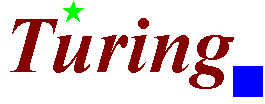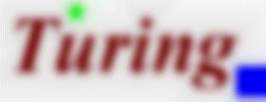Note that this is a fairly CPU intensive routine. On slow machines, it can take up to a second or more when blurAmount is large. In such cases, it is better to precompute the pictures before starting the program. The second example shows this being done.
View.Set ("graphics:270;120,nobuttonbar")
% Create the original picture
var f := Font.New ("serif:60:bold,italic,noantialias")
Font.Draw ("Turing", 10, 30, f, red)
Draw.FillStar (70, 80, 90, 100, brightgreen)
Draw.FillBox (240, 5, 270, 35, brightblue)
var oldPic : int
oldPic := Pic.New (0, 0, maxx, maxy)
loop
var newPic : int
% Create the new picture by blurring the old picture
newPic := Pic.Blur (oldPic, 10)
% Free the old picture so we don't run out of memory
Pic.Free (oldPic)
Pic.Draw (newPic, 0, 0, picCopy)
delay (300)
oldPic := newPic
end loop

|

|
The program below blurs an image, saving each step. It then draws the images in reverse order, making it appear as if the image is becoming successively sharper.
This means that you can only call the function by calling Pic.Blur, not by calling Blur.